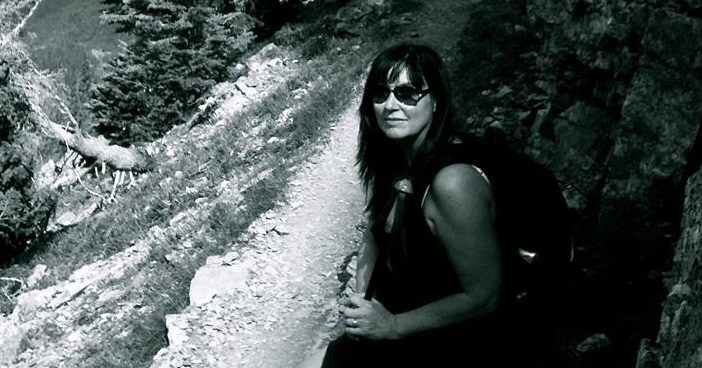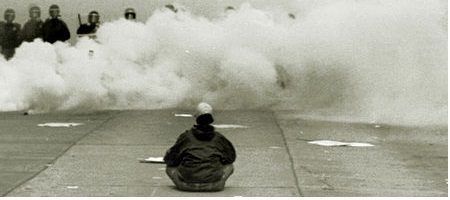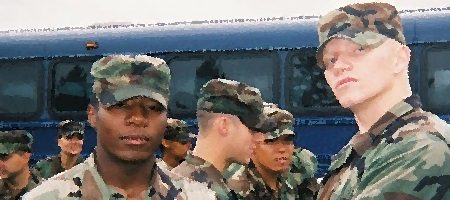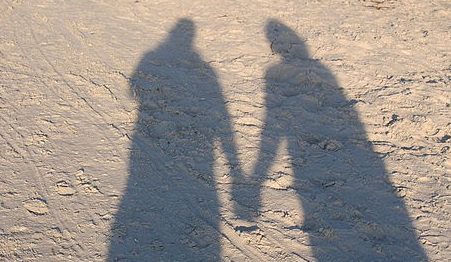RACHEL’S ANARCHY
Blessed are those who hunger and thirst for wonder,
for they will be filled.
~ The Anarchist Beatitudes 1:1
Her name was Rachel. She was born in 1969 on July 25th, the same day the Nixon Doctrine — the promise that America would act as a nuclear umbrella for its allies — was announced. She had never been pardoned, but she had been arrested. Six times. The first, at nineteen, for second-degree murder. That seemed like another life, one that she could forget, now that she was far from her Kentucky childhood. It was only her younger sisters who could draw her back to that place. Rachel didn’t often visit.
Three weeks after 9/11, she reluctantly packed her bag for New York City where her friends would protest the call for war. The American government called it Operation Enduring Freedom. As if everyone didn’t see this was another President’s crusade. The march would be one of a hundred protests she’d led. Rachel spent her time modeling shared power, fostering collective empowerment, and teaching people how to get out of jail. But now that the summer had ended, and the towers had come down, and her country was threatening war upon the innocent civilians of other nations, she was too tired to serve. She only wanted to lie in the king-size bed the three of them shared, and fuck.
She wanted her cottage in the woods and her feral life, a life unbound by convention or tradition or approval, a life nestled in the woods near Seattle. And here she was, reluctantly loading packs with first aid kits and wool socks and drums into a bus bound for another protest. Rachel’s anarchy was orderly, her chaos controlled. She was a lover of the Goddess and Gandhi and the Green Man. Her rebellion had been solidified alongside Tara Moon, whom she met fresh out of college, and then married in a hand fasting on Whidbey Island, on a wind-whirled day with the sea churning ribbons of rushes to the shore in a rhythmic throb. Nine years after the wedding, at the WTO march, at the end of her flaky Wanderer Period as Tara called it, Rachel found Ian, who everyone called Dragon (though his only observable superpower seemed to be bedding bohemians.) By the time they’d been released from jail — his first, her fifth — he’d dragged his well-loved ass home to celebrate Solstice with them, and just never left. Their ‘triad,’ Tara called it, but Rachel resisted the terminology of the collective, its principles pure, but its politically-correct language too confining for her free ears.
In the exhilaration of shutting down globalization at the Battle in Seattle, they felt the sacred Mother to be immanent on the land, they knew their magic was most powerful when aligned with political action, and they saw that in all their practices what was most alive was the Witch’s Rede: “Harm none, and do what you will.” Before Bush repealed the privacy laws, before the Patriot Act made anarchists a terrorist target, before librarians had to hire lawyers to defend their right to withhold patron’s records, there were Pagans circling in back yards, weaving intentions for peace in their spiral dances, trying to mount a resistance with ritual. They were midwives, herbalists, healers, hair stylists, accountants. Decades after LBJ and Nixon and their war, the anti-war activists were no longer anti-establishment hippies, but women who had offspring, professions, and portfolios. In their time together, Rachel, Tara Moon and Dragon insisted that they did not live in ambiguity, but instead resided in the still, sure knowledge that they were doing right, their conscience and their faith aligned, moving them to take risks others might not dare. They couldn’t believe themselves to be as doctrinaire as any other. If there was no text, there was no dogma. No dogma, then no fundamentalism.
That autumn, certainty had already begun to haze. Days before the war, Rachel couldn’t get out of bed. She wanted naked skin and the taste of another. Dragon was more than happy to comply. Tara wouldn’t have it. She said Rachel had a responsibility to continue her nonviolence training with the affinity group. They’d argued about Rachel’s lack of commitment. The day ended as their fights usually did. Rachel walked a mile into the woods and slept in the yurt next to the salmon stream that flowed near their land. In the morning Tara walked up the hill with a thermos of coffee, and gave Rachel The Speech.
“You’re the one with the courage. Remember the circle you led on N30? Honey, you are the backbone of this group,” Tara said, as she ran her hands through her cropped hair, currently dyed blue. She kicked a log into the fire ring while Rachel sat on the stairs of the yurt.
“I don’t want to go,” Rachel said.
The crows picked at the branches overhead.
“New York needs us.”
“I’m worn out.”
“If we don’t build upon our victories, we lose heart.”
The crow cawed. Rachel heard her lover like the incessant bird.
“Don’t patronize me!” Rachel said, but she was already tying on her boots. Tara bent down and kissed Rachel’s forehead, as if she was checking potential mutiny off a list of wifely tasks.
Rachel returned to the house. They ate the vegan blueberry pancakes Dragon made, and Rachel let him drag her to the shower, and he washed her hair, and he circled rosemary oil over her skin and he sucked at her breast and she pushed him down on his knees and she let him lap her up. The blaze. Before the burnout settled in her bones like scorched earth. Still, she knew she would get on the bus. Like Innana, the goddess of sex and war, the goddess who had been turned into a corpse by her dark sister in the Underworld, the goddess who had been hung out to dry like meat, Rachel had no way to get off the hook.
En route: Three days, six drivers, nine stops, twenty students, seven witches, two Tibetan monks, eighty-two vegan sandwiches, a dozen athamés, five digital cameras, a hundred lawyer’s business cards, twenty bandannas, six maps, two “Not In Our Name” banners, eight signs painted with fat letters: “Our Grief Is Not A Cry For War,” and two bottles of dish detergent to wash pepper spray from their skin. They hoped they’d never have to use the soap. After all, this wasn’t a hard-core march. They weren’t chaining their bodies together or unfurling banners from bridges. In an hour there would be an interfaith service at Union Square, then a march through midtown. Sometime that evening, the group planned to converge near Ground Zero to mourn in silence for those who had passed. There wasn’t supposed to be any trouble. This nebulous notion, Rachel noted, had resulted in every one of her criminal charges.
The bus drove into the city through the Lincoln Tunnel, and then they were in Manhattan, crossing Broadway, pulling to a stop in front of a convenience store near the park. Activists in the city said everything below 14th was a frozen zone: only emergency vehicles allowed, with national guardsmen blocking passage. Union Square was for mourners, its candles and photographs a familiar site on the news. Tara Moon stood as the bus engine went silent, and she thanked the Pagan Cluster for joining the Anti-Capitalist Convergence, the Peace Activists, the Buddhist students: “We’re in the city to deepen our connections with each other. We don’t expect to get attacked by counter-demonstrators, New York is still recovering. But emotions will be high…”
Rachel looked up to see a convenience store, its giant slurpee display, the question “Satisfied?” plastered on the glass. She needed its icy granules, its blue across her tongue, its head-aching sear. Without a word, she walked up the bus aisle in her Doc Martens, strode past Tara’s perch near the door. Then Rachel was in front of the machine, her hand pulling the steel lever that swirled frost-thick circles into a paper cup.
“You finished?” said a burly voice behind her.
Rachel turned, startled to see a man about her own size, with caramel hair and camouflage pants and a uniform-bland tee shirt. He was the color of sand.
“Sorry,” she said, and moved aside, searching the steel counter for the fat straws, the thick orange lid.
“I won’t be getting any of this stuff in a while,” he announced, his Southern drawl thick as biscuits.
She tried to ignore him, but he was looking her over, sizing up the silver Aphrodite on her belt buckle, the seven silver rings she wore on her fingers, the cuff of snake tattooed around her left arm, just under her muscled bicep.
“Shipping out tomorrah,” he said.
Rachel’s back straightened, her neck elongated in a habitual motion of righteous reproach.
“Sad,” she said. She spoke flat, deliberate, a condemnation.
“Someone’s playing Alpha and Omega,” the soldier said, and he grinned.
“We haven’t met. I’m Rachel. But you can call me any of the names of the Goddess you desire.”
“Athena. Goddess of war. How’s that?”
Rachel wanted to turn her back on him. But it was more important to make it difficult for him to see her in less than her full humanity. Instead, she took a deep breath. Let her sinless, sybaritic breasts fill up her organic hemp sweater. His Elvis eyes, hound-dog hungry and hazed in confusion, skimmed her creamy curves. She wielded the brut of her body. Less naïve than raw, more primitive than pretty, she asserted a kind of primal eroticism.
Rachel handed the soldier a lid and straw. He stared at the plastic, and then he raised his eyes to see her. Good, she thought, I’ve got him.
“We got off on the wrong foot,” he said.
“Where you going?” she asked.
“There’s a bunch of us, heading into Kandahar, but they won’t tell us the details until we get our orders.”
“They like to keep you ignorant. More control that way.”
“You been to boot camp too?” he teased, his smile wide, warm, the grin of a kid.
She laughed. “This your first time to the city?” she asked.
“Will,” he said, nodding.
“Hi, Will,” she said, holding out her hand.
“Army. Out of Fort Bragg. My people is from Owensboro.”
“Kentucky?” she asked, but she didn’t have to wait for the affirmation. She bit the inside of her cheek, and she felt the stare of the grandmother who raised her and then Frances’ words were upon her: “The land is not a ghost.” Here was a boy, straight from her homeland, her place, the place she had left at his age, the place she only returned to for holidays, scattered hours, after which she was grateful to leave again. She looked hard at the “Satisfied?” spelled backwards on the front window – ?deifsitaS. He followed her eyes to the question.
“We are not satisfied, and we will not be satisfied until justice rolls down like waters and righteousness like a mighty stream,” he said.
“Martin Luther King,” she said, looking closely at his calloused hands, his closely shaven face, his stubbled head.
She sipped her slurpee, staring silently, sizing him up.
“You think a dumbass soldier from Kentucky can’t know Dr. King?”
“I didn’t say dumb.”
“I can read it on your face.”
Rachel was surprised; she did think him stupid.
“History major. UK.”
“Me too. ’89. You?”
“I ran out of money. The government offered me a scholarship.”
“They traded cash for your…” she said.
“Say it.”
“Life,” she said. “You’re in the age bracket for the highest casualties.”
“Tall enough to get on the ride too.”
She laughed, picked up her bag. “Well, good luck, Will.”
His hand circled her wrist. Thumb stroked her palm. Head leaned toward hers.
“Stay,” he said.
“What?”
She looked out to where the students were milling on the sidewalk, checking their backpacks for water, food.
“The guys are at some club. I’m supposed to meet them later. But, I want to be with someone from home today.”
“Shit, man. You’re working me,” she said. She tilted her head toward the people milling around the bus, where Tara was tying a bandanna around her neck, looking capable, focused, intent. Will dropped Rachel’s hand, his warmth leaving her.
“Just a moment,” she said.
Rachel strode toward the sidewalk, constructing her story. Tara wouldn’t understand how she could walk away from a carefully planned agenda. Rachel wanted to tell some story about one of her visions that led her to this soldier, the visions she’d been having since she was eight, the peepin’ her grandmother trained her to manage. But she was a lousy liar. Tara and Dragon would know any story she offered was bullshit, their senses sharpened by time in the wild.
“I think I have a chance with him,” Rachel told Tara.
Tara crossed her arms in front of her breasts. Rachel’s arms flanked her sides in tight columns.
“At the cost of bailing on the group?” Tara asked.
“She’s just tired,” Dragon said.
“Fuck that,” Tara said.
Rachel looked behind her at the store window where she could see cheery Will standing at the checkout counter, buying gum, candy bars, Playboy Magazine. Dragon and Tara followed her gaze. Will caught their eye, nodded, all clean shaven and earnestness.
Rachel said, “I want to see what happens…”
“What?” asked Tara.
“When it isn’t so planned,” Rachel said. She reached for Tara’s arm and Tara batted her away.
“Bring him with us,” Dragon offered.
“She doesn’t want an us, sweetie,” Tara said.
“Not what I’m saying, Tara. Goddammit.”
Tara leaned in so the rest of the group exiting the bus and milling around on the sidewalk wouldn’t hear them: “It’s not only draining you, baby. Your ambivalence costs all of us. And you know, it’s really boring.”
Rachel’s eyes smarted. After a decade together, Tara knew how to inflict damage with the Parthian shot, the insult while retreating, aimed at the places Rachel most despised about herself. Will walked out of the store, stood at the edge of their tight circle, and chugged a Mountain Dew. Rachel stepped back so he could join their circle. Tara glared. Dragon pulled the soldier in with a handshake, a shoulder grab.
“Stay safe over there,” Dragon said, and then he kissed Rachel.
Tara directed the group to walk toward Union Square Park, and the group moved southward. Tara looked over her shoulder at Rachel, and then she strode away.
Will tore open a candy wrapper, shoved a Kit Kat bar in front of Rachel’s lips.
“You know you want it,” he said.
Rachel opened her mouth to bite it, then he pulled away, leaving her snapping at air.
“You fucker,” she said, punching his rock of an arm. He split off a rectangle, then fed it to her out of his hand, watching her face as she closed her eyes, allowed the wafer to melt.
“Where do ya wanna go, soldier boy?”
“Somewhere I can hear your story.”
He stepped aside and waited for her to go up the stairs. If he hadn’t come from the kind of family that opened doors for women, then the army made him that way: genteel, sweet, traditional.
“It’s okay. I’m a feminist.”
“Feminist is a word on an Ashley Judd t-shirt,” he quipped, and she laughed at his joke. Lately, everything had been so serious. It felt good to let herself be amused.
She had been to New York a dozen times for deep ecology conferences —permaculture at the Open Center, transpersonal studies, eco-feminism at NYU — and so she capably led him toward Broadway. They walked for miles, past the Empire State Building, and the lions at The New York Public Library, then they plunged into Times Square, where his eyes splintered in reflections of neon. A white-haired woman in a “New York Rocks!” tee-shirt asked Rachel to photograph her with Will, in front of the ticker scrolling the headline: Osama Bin Laden Says America ‘filled with fear.’ Will stood for the picture as a man-completely-lacking-irony — legs wide apart, chest high, arms clasped ‘at ease.’ After the rocker-woman kissed his cheek, Rachel grabbed Will’s hand, and held it for twenty blocks into Central Park. They ambled through the trails to Strawberry Fields, where the bohemians had placed garlands of marigolds upon the stone marked “Imagine.” Votive candles, their wax spent, their wicks brittle, littered the site, remnants from nightly vigils since September 11th.
“Everybody remembers where they were,” said Rachel.
“When?”
“Lennon. I was eleven years old. You probably weren’t born.”
“I got Columbine. Kurt Cobain. Matthew Shepard.”
“Laramie?” she asked, her head swinging in confusion over his possible sexual identity.
“My sister is with a woman.”
“What does she think about you going?”
He knelt on the ground, righted the candle stubs along the circle of the stone.
“You didn’t tell her.” She reached down, lay her hand against his cheek.
“Why did you leave home?” he asked.
Rachel watched the people in the park — babies being pushed in strollers, old men resting on benches, bicyclists angling for a road-speed record. She looked away until she had made her point: she wasn’t going to answer. He turned his head toward her hand, where it still cradled his face, and he kissed her palm. His kiss landed like a heavy stone into the pond behind the corn fields of her childhood. She was in Kentucky again. The heat at her palm exploded into her wrist, searing up her arm, burning over her shoulder, a flame that licked her throat, and then roared over her face. She fell. Will caught her body, eased it toward the ground. He held her neck and the panic was stilled. Her legs softened, and her eyes closed, and her lips parted, and her fingers relaxed, and the grip of her will dissolved. Her body gave into the bursts that sprang from her belly through her torso and then spasmed in jerking motions from her head. What looked like a seizure was for Rachel a vision, a premonition, an intuition. “Traveling” her lovers said; “peepin’” her grandmother called it. She’d been falling into these waking dreams her entire life.
A decade earlier, in her junior year of college, she knew she had to find a way to get her sisters out of their mother Darla’s grasp, after she’d walked into her mother’s home, after the front door had been unlocked, after she’d opened the bedroom door, after she’d seen Darla passed out on the bed, after she’d picked up the pill bottles on the side table and registered their names, after she’d turned her head toward the glow, after the family room flashed with the light of the television, after she’d inched her way to the man’s laughter, after she’d seen her mother’s young husband standing over her skinny, fifteen year old sister, Claire, after she’d looked at his bare legs, after she’d seen his dirty jeans on the floor, after she’d seen him thrust into Claire’s freckled face, after she’d seen Claire freeze in incomprehension, after he took Claire’s hair in his thick fingers, after he pulled Claire’s face into his groin, after Rachel realized she’d never seen this picture, even after years of tormenting premonitions, after she heard her grandmother’s voice inside her mind, after It’s what we do to get right with it that counts, after she’d gone out back for the hatchet, after she’d returned on tiptoe, after she’d struck her mother’s husband over the head, after Claire screamed, after Rachel sliced the air, after the blade nearly took his shoulder off, after the blood spurt onto the white shag rug, after Darla woke from her drug-dazed nap, after Darla scrambled down the hall and shouted her husband’s name and fell onto his bloody torso, after her sister Bette walked in from her date and dropped the fresh-churned ice cream onto the floor, after Bette called the police, after the ambulance took away the unconscious body, after Rachel was interviewed and released, after Rachel was charged, after Claire agreed to testify, after their stepfather received three years in prison, after Claire and Bette went to live with their grandmother, after Darla moved away, after it was all behind them.
Not behind her now. Rachel opened her eyes. Onlookers stared. Will held her head. He was right there, looking back, calm and unafraid.
“You had a seizure,” Will said, as he wiped saliva from her cheek, pushed the hair out of her eyes.
“I almost killed him. I wish I had killed him,” she whispered.
She let him lean her body into his until she could stand.
“You’re alright,” he said.
His eyes searched her face. He would be stoic; the army required heroism.
“My mama. She let the crazy in,” Rachel said. She placed her head on his shoulder, and allowed him to hold her there until her breathing slowed.
His arms were taut, giant — grunt arms.
“No shit.”
He tried to sound ironic, but he was earnest, sincere, the kind of men co-eds wanted to make babies with, and then leave years later when the romance sallowed into ESPN and taco night. “Crazy” to Will was a fifth of bourbon, and a four-wheel drive through a dried-up riverbank, and happy stories on Facebook that end in ‘LMAO!’ ‘Crazy’ was not afternoons spent dumping bottles of Vicodin down the toilet while your mother slept into the next day; it wasn’t coming home from school to find holy rollers or houligans camped in your living room; it wasn’t nearly hacking the arm off the stepfather who was barely six years older than you.
She looked up at Will’s tanned face, the pouty lip, the cleft chin. God, he was everything she desired and despised about Kentucky: traditional, loyal, chivalrous. As Southern as a blood-feud. Rachel craved her home town, and its smartass, baddass, assumptive nature. Her life had become complex. She was held by the weight of an ecologically destructing planet, and the breadth of the west’s expanding sexual freedom, and the heft of the information that spiralled into instant new networks commanding instant attention. This one night she would hold Will and she would assuage her longing. This had never worked in the past. Like other cravings, the memory of him would fall away and then heighten, the man made more important by the meaning she would assign him. That-time-Rachel-honored-the-soldier. Fuck. She hated the way she ached for the uncomplicated.
They walked with his arm tight around her waist until they reached Times Square, where it was twilight, and a crowd was gathering under a giant television. In Kabul — where fifty Tomahawk missiles had fallen on the city — the bombs looked like fireflies.
“We like to use their names for our war machines,” Will said. “Sell or starve. The way of the oppressor.”
Will wasn’t as innocent as she’d imagined. He bent down to kiss her. He smelled like tobacco and mint, like forfeited righteousness, like home. She wanted to tell him everything — all the parts that she’d kept hidden, all the instances she’d complied, all the ways she wasn’t brave. There wasn’t time. He was leaving in a few hours.
A man in dreadlocks, smoking an imported cigarette, turned toward Will.
“You are the oppressor, man.”
“I suppose if I think pleasant thoughts the wars will go away,” Will answered.
Rachel watched dreadlock man’s brow furrow. Will’s conventional exterior did not match his unconventional language. He used his words to disarm. And he was fucking well right. Thought alone wasn’t able to create anything. Nor was it able to harm, unless people let their minds be ruled. Rachel realized how wrong she had been. All along, the collective’s direct action methods had been teaching her that she must be willing to alter her entire life, not simply petition those in power to make changes. Their anti-war protests had become like military tactics: using obstacles, employing force, making demands. But what good was all of that if people like Will had fewer choices to educate themselves? No, they had to reconceptualize democracy. Nothing less. Create empathy for their tribe’s subverted norms. Bond to the capitalistic system itself, so that no escape from the altered political reality was possible.
Will gazed down at Rachel. Hers was the face of the strategist.
“Damn, girl,” he said.
She guessed he might like her more when she was confused, writhing, open. He rested his hand on her chest. Her breaths sped like her thoughts. She pulled him past barber shops and pubs, out of the fray of tourists, past the group tour locations on West 46th, until they were standing in front of a quiet street at St. Mary the Virgin Church. The aromas of Cuban, Indian, Scottish, Irish and Chinese food located in this small block sent a confusion of smoke and spice to her throat. She leaned him up against the stone column.
“What are you afraid of?” she asked.
“That you won’t let me take you to bed,” he said.
She laughed. So he was angling to get closer, she thought.
“Usually people are afraid of my episodes.”
“Your what?”
“Visions. Since I was eight.”
“Uh. Huh.”
“That’s it? Not even curious?” She thought he was pretending disinterest.
“I don’t assume what you’re seeing has anything to do with truth. Your imagination is just another explanation that helps you figure out things,” Will said.
“Nothing to do with your life, then.”
“I don’t hang out in the imagined future. I’ve got enough going on right here.”
“If you’re this smart, why can’t you get out of service?” she asked.
“Rachel.”
“I’m serious.”
“There’s nothing I can do about the time of my death,” he said, suddenly somber.
“What about how ravaged your mind is going to be by the time this is over?”
His grin twisted, and she knew she had gone too far.
“Dress it up in your politics. You want to change me,” he said.
She turned away from the face of the Blessed Mary looking down upon her. He took her hand.
“Who left you?” Will asked.
“This isn’t personal. I’m not anarchish. Economic and ecological collapse is on it’s way. This war is another sign of that. Can’t you see?”
“I see that your solution was to leave home.”
“So I could learn how to create something that can withstand big business and corrupt government.”
“And have you? You assume you’re the only one who knows how to help the people.” His voice broke.
She could see the leaving was alive in him. This was always what it was like in a demonstration, the time when the words failed and action was required. Will wasn’t any different than the masses who squandered their future in inertia. Thank God he had come along so she could make her way out of her moment of fucked-up apathy. Rachel felt grateful for him, for holding her in her unknowing, for asking so little of her, for helping her mind move again. Everything felt safer when she was moving.
Will looked at her as if from across a Kentucky holler. His eyes darkened and his lip twitched in disgust.
“Such assuredness,” he said.
All her knowing would seem sour, sharp to him, she thought. She was an empowered woman, that was the way of power. She wanted his body; his departure made the longing more intense. To her, he was an initiation, an undertaking, a battler, a slayer, a warrior. This was how she liked her lovers, all of them loyal soldiers.
She took his hand and they moved through the darkening city. She pulled him into an alley. Her hands moved hard over his body. She wanted the pleasure of touch. She didn’t notice that he stood there, hands by his side, taking it. She wanted to seem formidable, even in the ponderous morning.
____________________________________________________________________
SONYA LEA is a screenwriter, novelist and essayist.“Rachel’s Anarchy” is from her novel-in-stories, The Anarchist Beatitudes, which centers around three sisters from Kentucky, and the repercussions of loss in their adult lives. Her memoir, Wondering Who You Are, is about her husband’s cancer treatment, through which he lost the memory of their life. It won an international memoir prize and an Artist Trust Award. She has won several screenwriting awards, including the Nicholl Fellowship and has written for film and television
.
Sonya has written for Salon, The Southern Review, Brevity, Cold Mountain Review, Tricycle, Side B, the Seattle Post-Intelligencer, and the Prentice Hall Reader, a college writing text. Originally from Kentucky, she lives in Seattle, Washington. You can find out more at www.sonyalea.net.
____________________________________________________________________
Read more work by Sonya Lea:
Memoir excerpt in Salon
Non-fiction in Brevity





